I’ve always been able to relate to Col. Frank Fitts—yes, the violent, homophobic, self-hating, closeted gay Marine, who collects guns and Nazi memorabilia, beats his son, and murders Lester Burnham in American Beauty. Frank kisses Lester based on a misunderstanding, and when Lester turns out to be straight and gently rejects Frank’s advances, the realization hits Frank that he has inadvertently revealed his deepest secret based on a faulty assumption. Anyone who knows me knows that I’m about as far from a violent, homophobic, gun-loving Marine as you can get, and that I would certainly never murder anyone, but I have always completely understood why Frank feels he has to kill Lester.
American Beauty is all about the fear of not living up to other people’s expectations, and Frank’s dread over his error is palpable. He messed up. He embarrassed himself, and now Lester knows the truth he’s tried for so long to hide. Other people could find out and judge him. His irrational terror and helplessness over this is so strong and so excruciating that he can’t handle it. He has to kill Lester. It’s the only way for him to put an end to the unbearable situation that he’s put himself in.
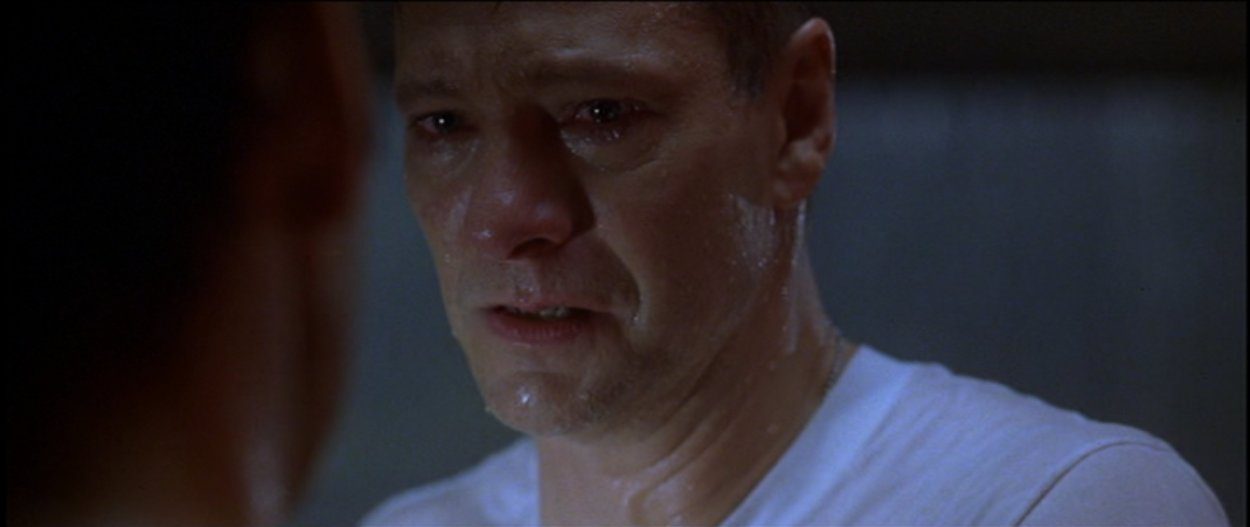
I understood exactly how Frank felt when I first watched American Beauty as a teenager. It wasn’t until I was in my late twenties that I was diagnosed with social anxiety disorder. The DSM-5 states that social anxiety disorder includes “a persistent fear of one or more social…situations in which the person is exposed to…possible scrutiny by others. The individual fears that he or she will act in a way…that will be embarrassing and humiliating.” American Beauty may be about a more general fear of not living up to other people’s expectations, rather than a clinical phobia, but after I was diagnosed, I understood at last why the film had always resonated so strongly with me.
Those of us with social anxiety generally understand that it’s irrational, but the intense fear overrides that knowledge. It overrides logic, free will, and sometimes even matters of life and death. I would never kill someone over it, like Frank kills Lester, but I understand the impulse behind it—the way that social anxiety can place itself above the preservation of life in the hierarchy of your malfunctioning brain.
When trying to learn to drive, the opinions of my fellow drivers overrode the importance of safety. I would pull out into traffic without checking if it was safe, because I didn’t want to be judged for waiting too long. Social anxiety had me endangering the lives of myself and others because the terror of being judged was stronger than the fear of death. I don’t drive anymore. I’ve also been concerned about what would happen if I ever had to call 911. Would someone die because I was worried about not knowing exactly what I was supposed to do or say, and therefore couldn’t make the call? Thankfully, I’ve never had to find out. In Frank Fitts, American Beauty articulates these irrational fears better than anything else I’ve ever seen.
The key—easier said than done—is to live up to your own expectations of yourself, and not care about what anyone else thinks (other than still trying to be decent to people). In American Beauty, Ricky Fitts, Frank’s son, largely manages to do this. If Frank is at one end of the social anxiety spectrum, then Ricky is at the other. From my first viewing of American Beauty, I desperately wanted to be Ricky—to be confident, to never be scared, and to be free from caring about what other people think. It’s clearly implied that Ricky was once like the rest of us, worrying about other people’s opinions, but he managed to get over it.
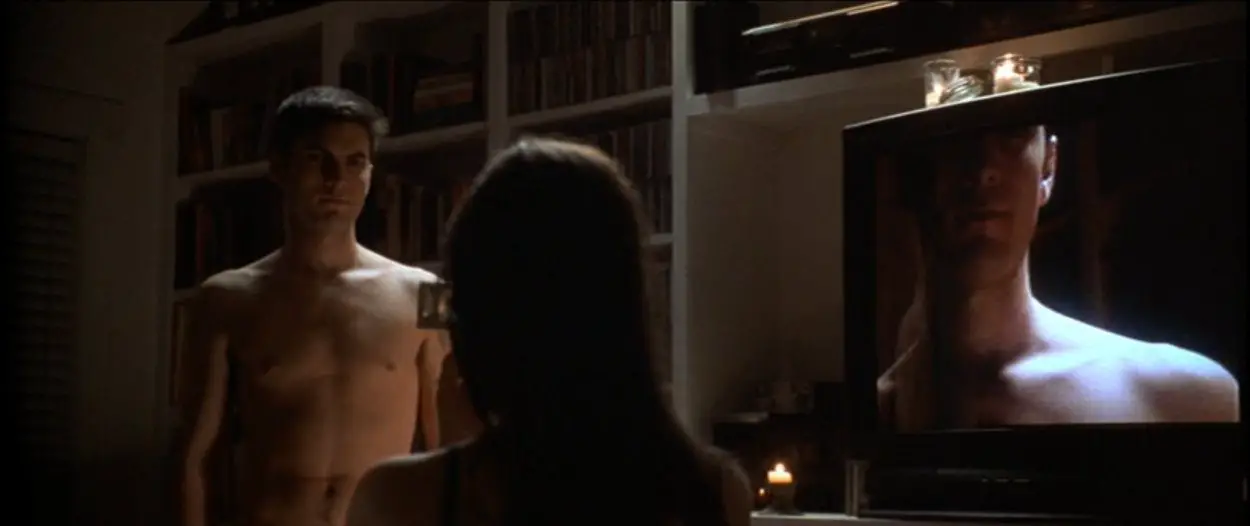
It’s never stated that Ricky actually has any specific mental disorder, just that he was committed to a mental institution because he snapped one day after being beaten by his dad and made fun of by a classmate. He is now no longer scared of what people think, though he attributes this to the epiphany he had while watching a plastic bag dancing in the wind—that the world is full of beauty and there’s no reason to ever be scared.
I used to dream of the sort of undefined insanity that led to Ricky being committed. I’d fantasize that one day I would snap, go insane and no longer care what people thought of me. Or that I’d start taking drugs and take a downward spiral into a state of mind where I no longer worried about other people’s judgments. That’s how bad social anxiety is—these are the things you fantasize about, because it seems like they would be preferable to the hell you’re trapped in every day. Little did I know that the thing I thought I could escape through “insanity” was actually a mental disorder itself. I was already mentally ill, and that was the thing ruining my life, not the thing that could save me.
The central journey of American Beauty is, of course, Lester’s—from a depressing life dictated by the need to live up to other people’s expectations, to the happiness and fulfilment of a life no longer defined by what anyone else thinks. In other words, it’s the journey from Frank Fitts to Ricky Fitts—the journey I was always desperate to take. Lester manages to escape the crushing pressure from society that tells us we need certain jobs with a certain prestige, even if they make us miserable. He returns to a simple fast-food job that makes him happy. He manages to escape the insidious brainwashing of capitalism that tells us we need to be productive and constantly making money in order to be worthwhile as human beings. He finds value and satisfaction in enjoying life, and finds meaning outside conventional measures of success.
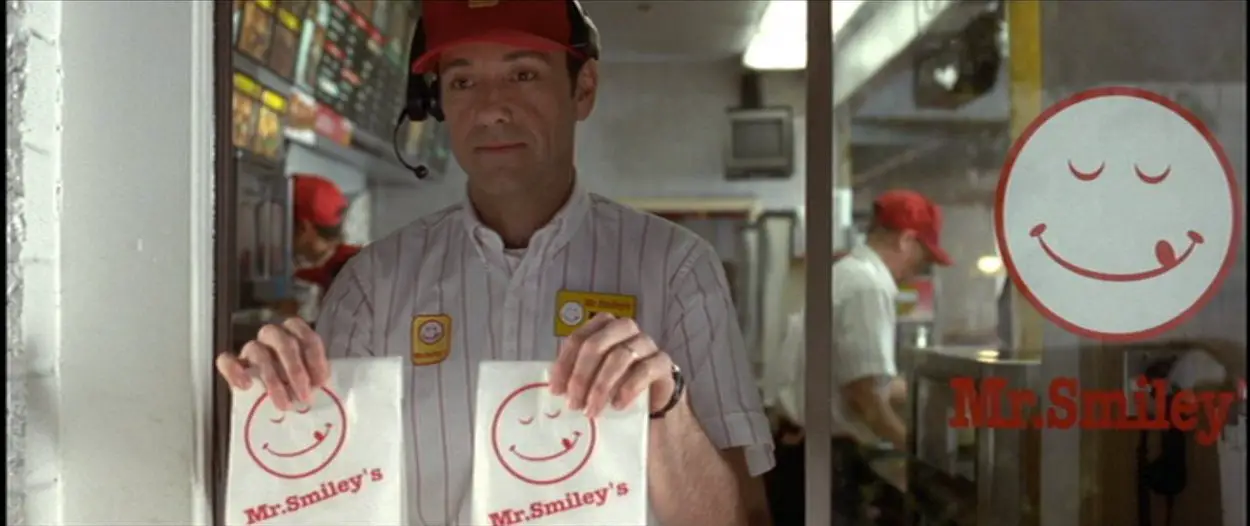
Lester manages to escape the toxic notion that to have the best life we need to buy the best things, and that possessions should be prized above experiences. He tries to convince Carolyn of this when she is distracted from an intimate moment with him by the thought that he might spill beer on their couch, but the moment is already ruined. He manages to escape the conviction, rooted in fear, that we need to stay in dysfunctional relationships, rather than being alone, starting over, or disturbing the status quo. He starts speaking up about all the things he’s unhappy with in his marriage, and eventually accepts that he can’t fix it when he sees Carolyn with Buddy. He tries to move on with Angela, and however misguided that might be, it’s a start.
Lester manages to escape the pervasive social norms that tell us we should just keep quiet and push down our dissatisfactions, that it’s inappropriate to reveal our true feelings if they might make people uncomfortable. He mortifies Brad with the incredible statement he writes about his workday, and he makes people all around him cringe as he starts to actually stand up for himself and be honest about his opinions.
Interestingly, it’s largely Ricky, representing freedom from caring about expectations, who inspires Lester to live (through smoking pot and nonchalantly quitting his job in front of him), while it’s Frank, representing the absolute terror of not living up to expectations, who ultimately kills Lester. Of course, from a storytelling perspective, it’s okay that Lester dies, because he learned to truly live first.
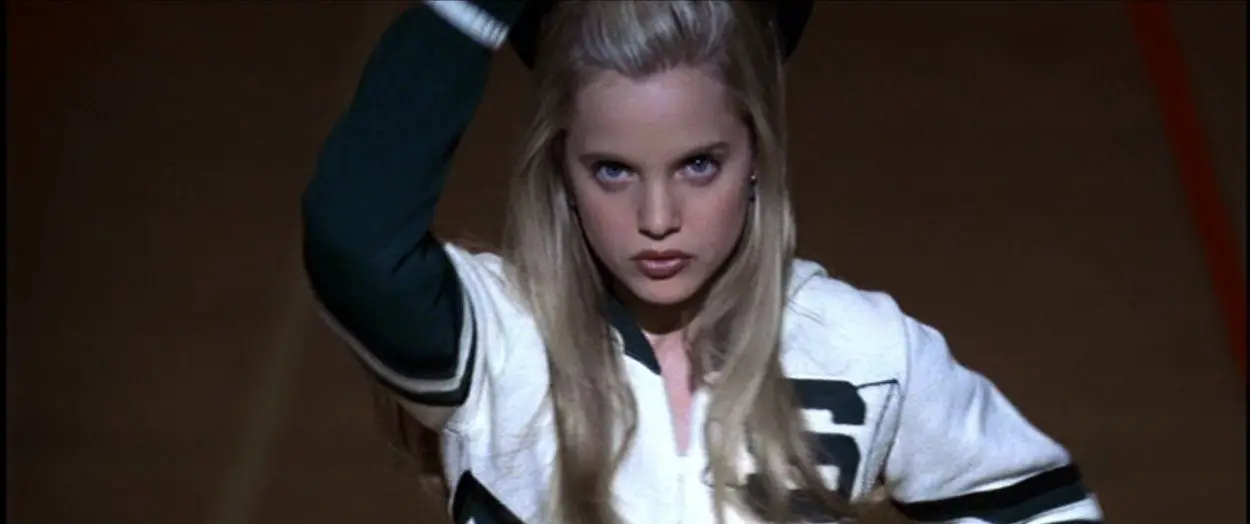
American Beauty explores the fantasies that come easily when you’re stuck not living the life you want, trapped by social anxiety and the weight of everyone’s expectations. These can become unhealthy obsessions over something or someone you can never really have, like Lester and Angela’s infatuation with each other. Eventually, rather than remaining trapped in fantasies, you need to break free from worrying and take steps towards living the life you want, though this doesn’t always work. Lester and Angela, who never really get to know each other, are unable to turn fantasy into reality, but maybe after their encounter they both understand that they have to find what they want in a healthier way, looking for it in the real world rather than in a fantasy.
Ricky and Jane, on the other hand, are able to turn their obsession with each other into a real relationship. He’s confident and acts on his feelings, and they actually get to know each other, moving on from the somewhat unhealthy behavior Ricky exhibits when he first takes an interest in Jane. Overall, sometimes fantasy is necessary—it can be the beauty we hold onto when times are tough, or the thing that wakes us up and nudges us to go after what we want in a healthier and more achievable way.
Some people may think Ricky’s video of a plastic bag dancing in the wind is cheesy, or pretentious, but the point isn’t really the video itself, it’s the idea behind it—that it’s possible to find meaning and beauty in everyday life. When it feels like you aren’t living your life at all, when social anxiety and fear of what people think are causing you to fritter all your days away, it’s those rare moments when it feels like you’re really living, really connected to the world, that keep you holding on. In those moments, the beauty of being part of ordinary life—something you’re usually separate from—is breathtaking.
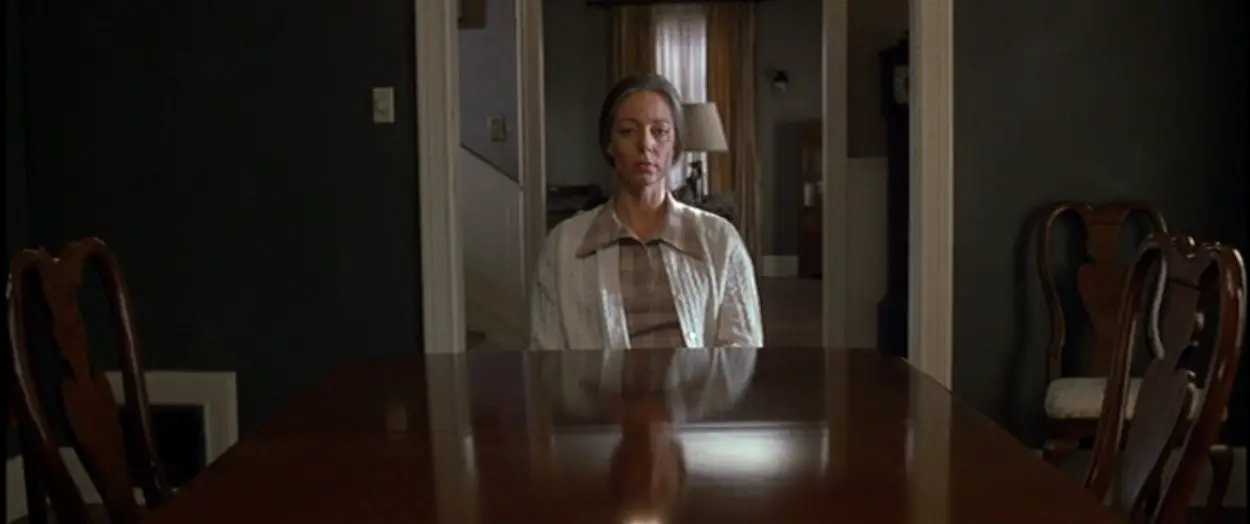
Barbara Fitts, Ricky’s mom, is also implied to be suffering from some unspecified mental illness, echoing Ricky’s own unspecified diagnosis, and she is shown to have very little agency over her own life. She seems to drift aimlessly through each day, occasionally nudged into action by Ricky or Frank. This is the emptiness of a life where mental illness has taken away your agency, as social anxiety disorder and most other mental illnesses do, at least to some extent.
Sometimes it can feel like our agency has been taken away not just by mental illness, but by the people around us. When it’s because they don’t want to do something, like Buddy rejecting Carolyn because he’s worried about an expensive divorce, or Lester rejecting Frank because he doesn’t feel the same way, it hurts, but it’s fair enough. But when it’s because they’ve decided they know better than us, that they don’t trust us to make decisions for ourselves—like Lester rejecting Angela because he finds out she’s a virgin—it becomes problematic.
Sure, there’s a big age gap between Lester and Angela, and maybe that means there will always be a power imbalance. Yes, Angela is young, but she’s no younger than Jane, and it’s portrayed as a positive thing when Jane makes the decision to have sex with Ricky. There will never be an exact age at which everyone becomes mature enough to consent to sex. It will always be slightly arbitrary. This isn’t a case where Lester is pressuring or coercing Angela into doing something she doesn’t want to do. It isn’t a case where she’s clearly too young to consent.
From Angela’s point of view, Lester finds out she’s a virgin, decides she’s too young and inexperienced to make this decision herself (which she’s already made and is pretty clear about), and takes away her agency. Again, from her point of view, he’s also essentially punishing her and judging her for not living up to his expectation that she should be more experienced. Maybe he really is doing the right thing, but it just feels like it feeds into the Madonna-Whore Complex where women can’t win. They can be rejected for being too experienced, or they can be rejected for not being experienced enough. In this case, it happens to be the latter.
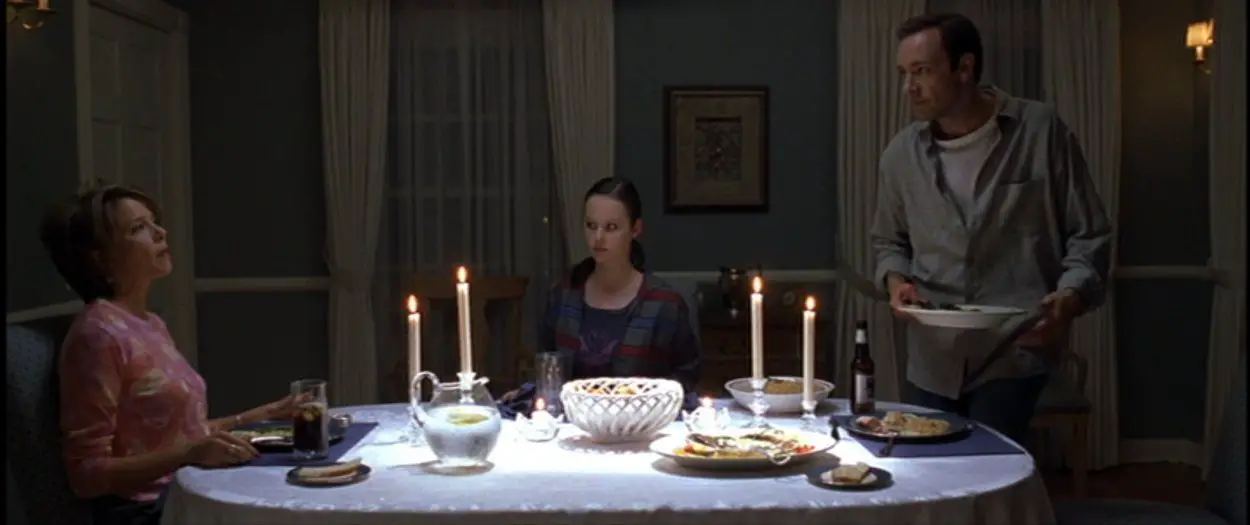
The fear of not living up to other people’s expectations can cause us to silence our own voices, to impose unreasonable expectations on ourselves, and to let our needs go unmet. When this happens, we inevitably become frustrated. This frustration always escapes, directed at those around us. Frank beats Ricky up over the smallest infractions. Lester, Carolyn, and Jane constantly take swipes at each other and show disdain for their family life. Angela lashes out at Jane when she’s feeling insecure.
In an effort to calm this frustration, Carolyn and Buddy decide to shoot guns. With their shared philosophy of needing to project an image of success at all times, neither of them can allow themselves to live the life they want, to be honest with anyone, or to go after the things they personally need—like satisfying sex and relationships. It seems like they could have these things with each other, but it’s short-lived. Neither of them has any real agency in their own lives. They shoot guns in order to gain the sense of power that they lack in their lives, but it’s all fake. They aren’t actually taking control of anything.
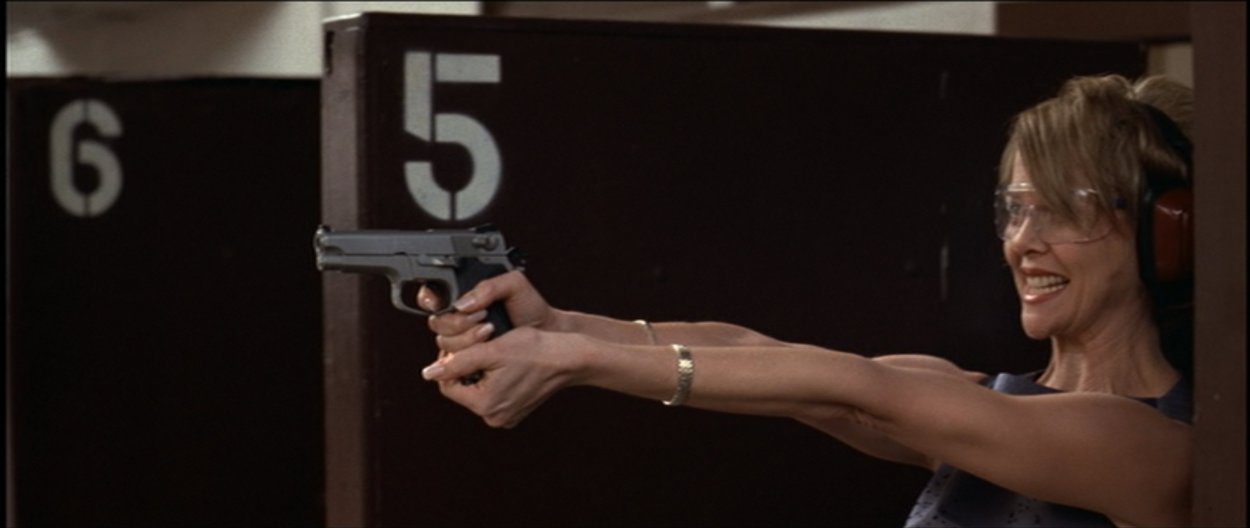
Frank is also obsessed with guns, owning a cabinet full of them as a similar substitute for agency in his life. After he kisses Lester and starts to feel the situation spiraling dangerously, he shoots Lester to try to gain the illusion of control, but again, it’s fake—he’s only burying his truth and desires. He’s not being honest about them, he’s not taking control, and he’s not living the life he wishes he could. He can’t do that, because he’s too scared of what people would think.
Interestingly, as the least repressed—and so least frustrated—character, Ricky is perhaps the only one who doesn’t place blame on his family or those around him for the things that go wrong in his life. He even has compassion for his father, despite how absolutely awful Frank is to him. Ricky isn’t consumed by fear of other people’s expectations, he isn’t suppressing his thoughts or desires, and he isn’t afraid to go after what he wants in life. His lack of frustration allows him to be compassionate, and he doesn’t feel the need to hold onto grudges. He’s able to take constructive steps to improve his life, rather than just getting angry. He deals drugs so that he can pursue his passion of filming beautiful things. He plans to move to New York with Jane rather than letting his father mistreat him any longer.
Of course, Ricky does have to hide things and worry about his dad’s expectations to an extent, but he’s not scared of what Frank thinks of him. He’s not even scared of being punished or beaten. He’s just being practical and trying to avoid these situations. He doesn’t want to deal with pointless confrontations with Frank, when he knows that he’s never going to agree with or live up to Frank’s toxic expectations.
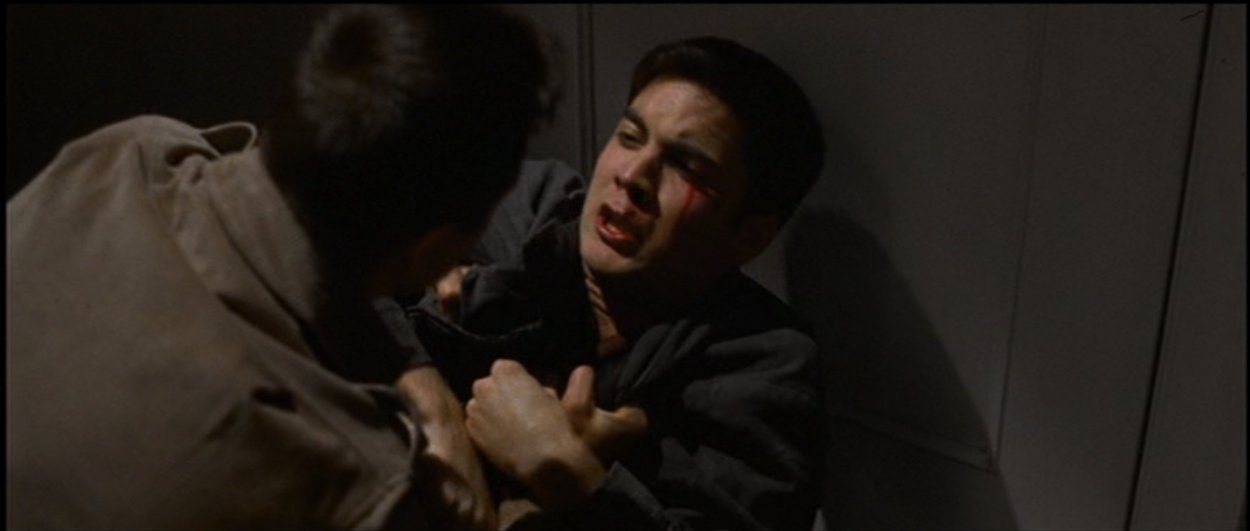
Maybe sometimes you have to accept that you can only have limited relationships with certain people. At first, Lester doesn’t want to give up on Carolyn, so he keeps trying. He keeps fighting with her, keeps confronting her, and keeps standing up for himself, in the hopes that he can get her to understand the value of not being ruled by fear. As Ricky accepted long ago, and as Lester begins to see, sometimes it’s just too exhausting to keep fighting, to keep justifying yourself to those who are trying to uphold the fear and expectations that you’re working to overcome.
In the case of social anxiety, it can sometimes feel like loved ones are siding with the anxiety disorder, instead of siding with you to fight against it. This happens when people caution you against taking risks, or urge you not to rock the boat. This is what Carolyn does when she berates Lester for quitting the job he hated, or when she stops him from spilling beer on the couch—prioritizing the way their living room looks over a chance to connect. To advocate caution to someone whose fear is already stopping them from taking any risks, and therefore from living any kind of life, to push other people’s expectations onto someone who is already paralyzed by their terror of them—this is the equivalent of giving a glass of wine to a recovering alcoholic. It’s harmful, disrespectful, and it’s something that is not acknowledged or talked about enough.
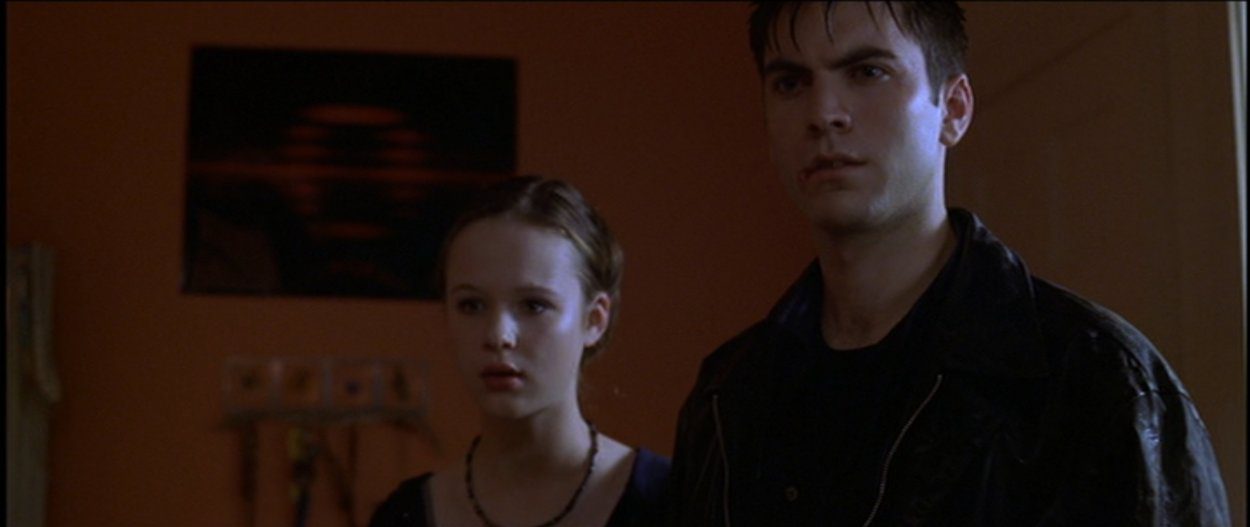
American Beauty makes the point that trying to live up to expectations, or taking other people’s judgments seriously, doesn’t even make sense, because everyone’s expectations and opinions are different anyway. This is perfectly illustrated by the way Ricky sees Angela, dismissing her as boring and ordinary, versus the way Lester sees her—as anything but. Similarly, the way Ricky and Jane are viewed by most people, as freaks or unattractive, clearly differs from the way they see each other, as fascinating and beautiful. Unfortunately, anxiety isn’t logical, and fear of what people think still plagues many of us, despite knowing all of this.




Hai Natasha thank you for that insightful quote about the movie you detailed everything I wanted to know about the movie and well it’s true that many are times we live trying to impress other people, which is sad bcoz we deny ourselves to live a genuine happy lives that we forget to appreciate every moment of our lives bcoz we want to fit in other people’s expectation everytime